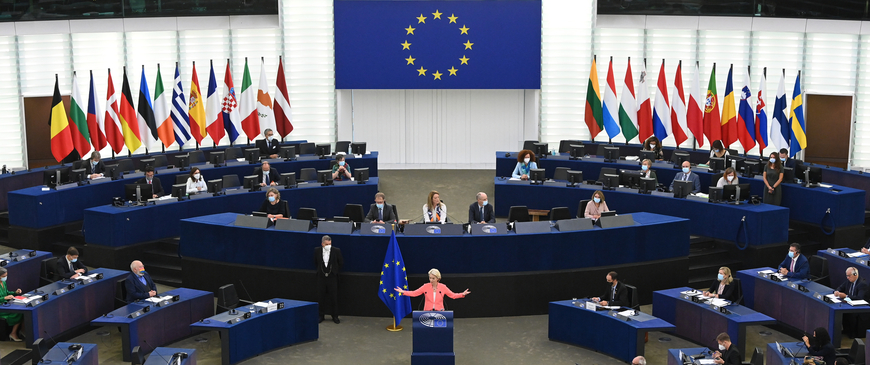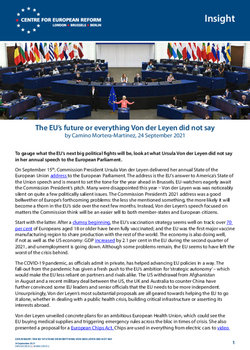
The EU's future or everything von der Leyen did not say
To gauge what the EU's next big political fights will be, look at what Ursula Von der Leyen did not say in her annual speech to the European Parliament.
On September 15th, Commission President Ursula Von der Leyen delivered her annual State of the European Union address to the European Parliament. The address is the EU's answer to America's State of the Union speech and is meant to set the tone for the year ahead in Brussels. EU-watchers eagerly await the Commission President's pitch. Many were disappointed this year – Von der Leyen was noticeably silent on quite a few politically salient issues. The Commission President's 2021 address was a good bellwether of Europe's forthcoming problems: the less she mentioned something, the more likely it will become a thorn in the EU's side over the next few months. Instead, Von der Leyen's speech focused on matters the Commission think will be an easier sell to both member-states and European citizens.
Von der Leyen's SOTEU was a good bellwether of Europe’s forthcoming problems: the less she mentioned something, the more chances there are this something will become a thorn in the EU’s side over the next few months.
Start with the latter. After a clumsy beginning, the EU's vaccination strategy seems well on track: over 70 per cent of Europeans aged 18 or older have been fully vaccinated; and the EU was the first major vaccine manufacturing region to share production with the rest of the world. The economy is also doing well, if not as well as the US economy: GDP increased by 2.1 per cent in the EU during the second quarter of 2021, and unemployment is going down. Although some problems remain, the EU seems to have left the worst of the crisis behind.
The COVID-19 pandemic, as officials admit in private, has helped advancing EU policies in a way. The fall-out from the pandemic has given a fresh push to the EU's ambition for 'strategic autonomy' – which would make the EU less reliant on partners and rivals alike. The US withdrawal from Afghanistan in August and a recent military deal between the US, the UK and Australia to counter China have further convinced some EU leaders and senior officials that the EU needs to be more independent. Unsurprisingly, Von der Leyen's most substantial proposals are all geared towards helping the EU to go it alone, whether in dealing with a public health crisis, building critical infrastructure or asserting its interests abroad.
Von der Leyen unveiled concrete plans for an ambitious European Health Union, which could see the EU buying medical supplies and triggering emergency rules across the bloc in times of crisis. She also presented a proposal for a European Chips Act. Chips are used in everything from electric cars to video games, and the EU wants to secure Europe's supply by boosting production capacity in Europe. The Commission also aims to put the EU at the front of the technological race by increasing investment in European research.
Von der Leyen stopped short of talking about an EU army – a contentious issue for many EU capitals – but said the EU needs to work towards a European Defence Union. She proposed three concrete ideas: a new 'Joint Situational Awareness Centre', to better share intelligence between member-states; a waiver of VAT on defence equipment produced and bought in Europe, to boost interoperability and reduce dependence on non-European suppliers; and new European cyber security laws to stop attacks and put Europe at the forefront of global cyber defence efforts.
While most of Von der Leyen's 'strategic autonomy' proposals are relatively uncontroversial, some will not be without problems: the US would oppose the lifting of defence VAT because it would disadvantage American defence exports to Europe; and repatriating chip production to Europe will take a very long time and certainly need more than a law. But all are ideas that please Paris and have Berlin's tacit accord. French President Emmanuel Macron will push for more ambitious defence and industrial policy plans. His leadership is likely to go uncontested over the next few months, as Germany gets a new government and France takes over the rotating presidency of the Council of Ministers. Central and Eastern European member-states are unhappy with big EU defence plans but may be open to exploring alternative ways to counter Russian influence. The Baltics have an interest in containing Russia, too, and have been zealous advocates of a common European cyber defence policy for years. Southern EU countries support strategic autonomy insofar as it does not irk the Americans too much.
This relative consensus will not be easy to replicate in other topics. Going forward, the EU's biggest political fights will centre around three issues: the rule of law, climate change and fiscal reform. None of the three got much air time during Von der Leyen's address to the European Parliament.
The European Commission argues that there is nothing new to say about the ongoing rule of law brouhaha because the EU has all the tools it needs to deal with the crisis. This is only partially true. The Commission has triggered disciplinary proceedings against Poland and has done an exceptional job in pushing a sweeping rule of law plan through the EU's legislative machinery – including a contentious law to freeze EU funds in case of persistent breaches of EU values (the so-called conditionality mechanism). Yet, none of these measures has stopped democratic backsliding in Hungary and Slovenia; nor have they reversed the Polish government's attacks on the judiciary. Crucially, the Commission has still not been able to trigger the conditionality mechanism because of political disagreements.
The Commission can and should be more ambitious in upholding the rule of law in Europe. One idea is to come up with a plan to bundle together all existing mechanisms protecting the rule of law in the Union. The plan would then need to include rule of law matters within the EU's broader area of freedom, security and justice (AFSJ) – which includes migration policies, police and judicial co-operation and border controls. The new scheme could link rights and obligations on all these areas and set up an oversight process similar to the European Semester – a monitoring mechanism of national economic policies. (At the CER we are developing this idea and will present a plan later this year).
Climate policies will also be contentious. All member-states agree that the EU needs to take action to limit climate change; but the details of the plan will be divisive. In July, the Commission unveiled its landmark 'Fit for 55' climate policy package – an overarching set of 13 laws to reduce EU-wide greenhouse gas emissions in 2030 by 55 per cent, relative to 1990 levels. Back then, Europeans were ready to set off for the summer, more worried about flash floods, vaccine passports and COVID-19 variants than about energy prices. Experts warned that the Commission's proposals would face political resistance, as both consumers and business would have to pay higher energy bills. Not all EU commissioners were on board, either – as many feared a backlash at home. But few thought the matter would become so toxic so fast. Energy prices are rising sharply in many member-states, as the world economy rebounds and gas supply is tight. Russia, Europe's main gas supplier, has refused to increase exports this year. Energy and climate was one of the few policy issues to feature prominently in the German election campaign; and governments in Romania and Spain are under fire because of soaring consumer prices. Von der Leyen knows that climate action will be a testy debate and chose not to insist on it during her speech – in contrast to her previous public appearances.
The reform of European fiscal rules will also prove controversial, to put it mildly. In response to the pandemic, the European Union suspended parts of its Stability and Growth Pact (SGP), a set of rules that govern member-states' budget deficits and debts. To support the economy during lockdowns, EU governments had to run enormous deficits, much beyond the 3 per cent of GDP allowed for by the Pact. Public debt shot up as a result: by July 2021, government debt in the euro area was up to 100.5 per cent of GDP (the SGP sets the longer-term target for public debt at 60 per cent of a country's GDP).
The reform of the SGP is as much desired by the South as it is opposed by the North. Reformers want to adapt the targets on debt and deficits to reflect record-low interest rates and large investment demands, for example on climate change. The pandemic has made the case for reform more convincing and more urgent, and yet politically even thornier. The Commission has said it would not reactivate the rules until 2023. Some member-states, like Spain and Italy, think the rules should be revamped before that. Others, like Austria, the Netherlands and Sweden, oppose any changes and argue that higher debt levels make fiscal consolidation even more important. They also point to the EU recovery fund that they have agreed to, meaning that not much political capital is left to reform fiscal rules. This is not going to be an easy debate – particularly if Germany has a care-taker government for six months or longer while coalition talks take place. Von der Leyen will have to tread carefully around national interests but she should not shy away from putting forward some ideas for reform, like allowing for higher debt thresholds.
The transition to a post-pandemic world will be a test for the EU leadership. As pressure eases, the EU’s leaders will need to show that they have a project for the future of the European Union.
The transition to a post-pandemic world will be a test for the EU leadership. Von der Leyen had only been in office for a few months when the COVID-19 pandemic hit Europe. The EU immediately switched to crisis mode and has been operating under exceptional rules ever since. As pressure eases, the Commission President will need to show that she has a project for the European Union – including plans to deal with divisive issues ahead.
With Angela Merkel leaving politics, Von der Leyen now has the chance to move beyond the long-time German Chancellor's towering shadow. She will also need to temper some of France's ideas for strategic autonomy and ensure that the EU does not become inward-looking at a time when international co-operation is crucial for the West. Von der Leyen may have grand plans for Europe. She should use the following months to spell those out or she risks becoming engulfed in the big political fights she has been so keen to avoid.
Camino Mortera-Martinez is a senior research fellow at the Centre for European Reform.


Add new comment